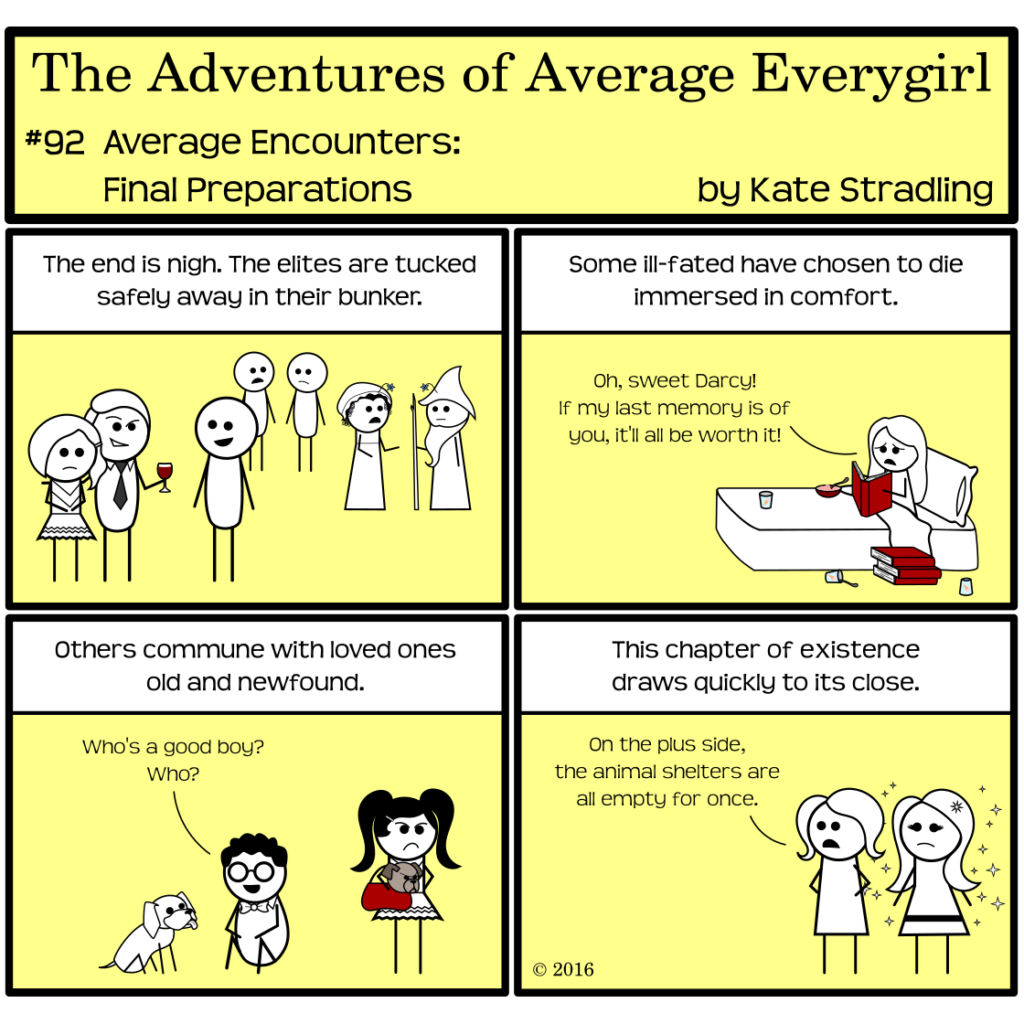
The crisis nears its end!
Last week, in the midst of procrastinating a fair number of tasks, I read a book. It was a decent story, sound in writing mechanics, pretty good dialogue, interesting plot points, and so forth. However, there was one major problem: its pacing was
so
very
slow.
I wanted to like this book. I really did. But I kid you not, it took eight pages—eight—for the protagonist to wake up, get dressed, and go down to the kitchen for breakfast.
Eight pages.
There was backstory aplenty and introspection galore, and even a little eavesdropping on other characters Doing Things, but the end result was a narrative that dragged like a legless dog on a leash.
Which was tragic because, again, the writing was sound. This was a skilled author.
I’m not passing judgement. I’ve been there before, so deep in my character’s life that I included every minute detail and motivation and thought. To some extent, it’s part of my drafting process, to reassure myself that I know my character, that I know my plot, and that I know what’s happening at any given moment.
But the reader doesn’t need to know 90% of it and may well get annoyed at the surplus information. We live in an age of instant gratification. No one wants to wade through eight pages of prose just to transport a main character from their bedroom to the breakfast table. Those details might make it into the first draft, but that doesn’t mean they should stay for the final one.
The Value of a Crisis Mindset
I’ve heard publication dates referred to as “book birthdays,” but I prefer to view them as another life event entirely: they are manuscript death-days. The book, once published, exits the creative process. Sure, you can make minor changes or corrections here and there. Our modern indie industry actually allows for full-blown plot overhauls and rewrites. However, any drastic changes will disrupt the trust relationship between author and reader. The goal in publishing has to be a polished end-product.
The publication deadline, then, presents a crisis—an end-of-the-world scenario, if you will.
And, as with real-life crises, it gives the author cause to zero in on what is truly essential.
Drafting vs. Editing
The drafting process, hard work as it is, has a carefree angle to it. You can create a whole cast of characters, endless gratuitous scenes, and witty dialogue that runs on for pages and pages. Eventually, through this drafting stage, everything gets cobbled together into one flowing narrative, and you type “The End” with a final flourish on the last page.
But that’s actually only the beginning. With a first draft complete, the looming crisis of publication engages. You enter the editing stage.
Some authors edit as they go along. (I do, certainly.) They get to the end of a draft and feel as though their project is complete. (Again, guilty as charged.) There is a fundamental difference between the drafting and the editing stages of writing, though:
Drafting is for the author’s benefit; editing is for the reader’s.
Audience Appreciation
Pretty much any project that does not consider its audience’s needs separate from its creator’s intentions will fall short of its full potential. The purpose of the editing stage is to refine that raw material produced in the drafting stage.
This is a time to strip away all the extra descriptions, break up with the unnecessary characters, ditch the irrelevant scenes, and train a narrative’s focus upon the fundamental themes of the story. It’s a time to honor the reader by considering their expectations and ensuring that the story delivers on any promises it made.
A crisis mindset allows an author to sit down with their manuscript, acknowledge that the two will soon part ways, and to reinforce the story’s most important principles before sending that little bundle of joy out into the world to get shredded to pieces by the rabid readers that await.
(Only kidding, readers. You are mostly wonderful.)
While there’s no possible way to please 100% of an audience—and I’m not saying anyone should try—the end goal, simply, is to present the most polished story that an author can for where they are in their writing journey.
As difficult, tedious, and headache-inducing as the editing process can be, it’s nothing to bemoan. Editing is where the true craft of writing begins.
It is, in short, essential. Carefully attended, it allows an author to meet that crisis of publication with confidence and bid farewell to their lovely manuscript with no regrets.
After reading the comic but before reading the post, I had this moment where I was like, “Wait. Nothing really happened.”
Good job.
Haha, thanks. It’s that quiet breath before the big event. 😉
Comments are closed.